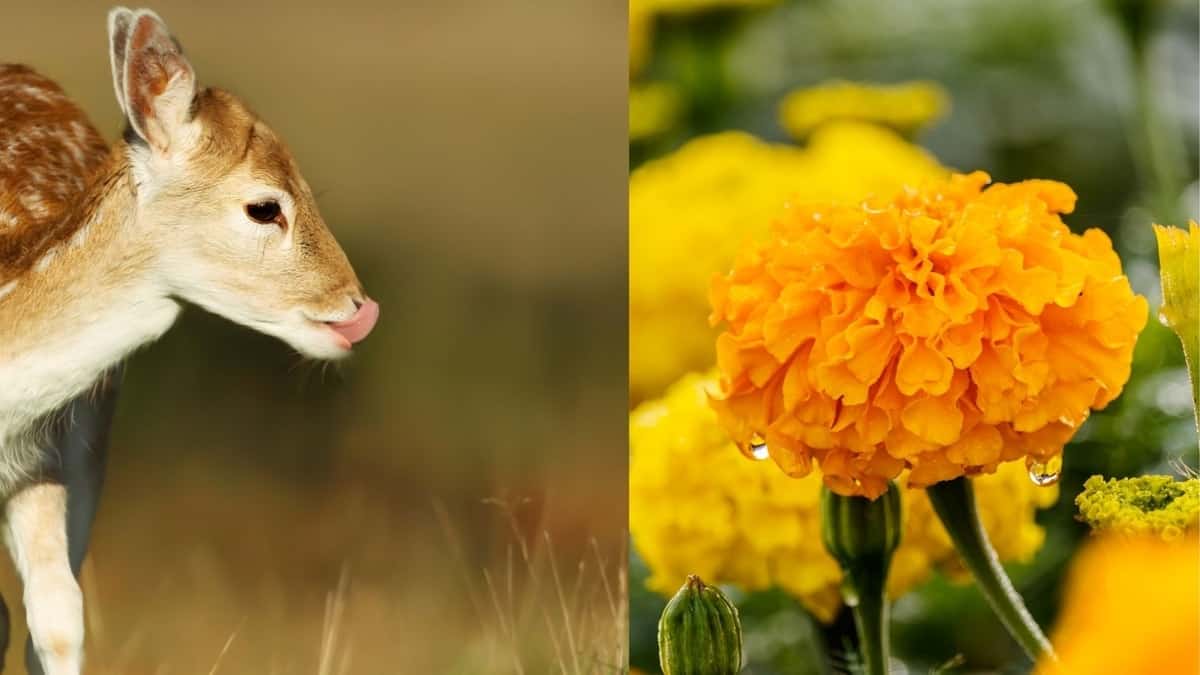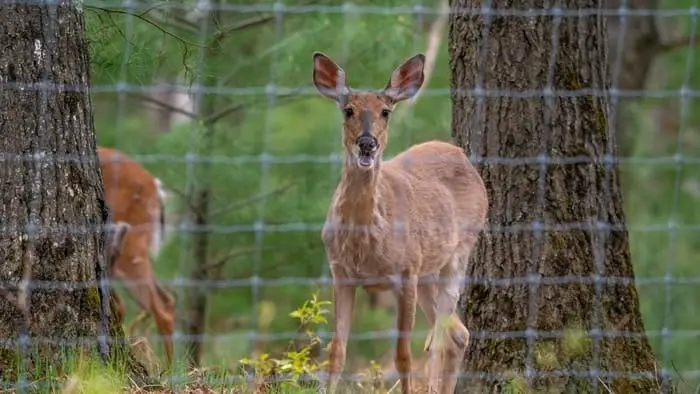Last Updated on January 26, 2022 by
Do deer eat marigolds, or do they help keep these destructive animals away from your garden and plants?
You might have been advised by your fellow gardeners to grow marigold because they will help you keep deer and rabbits away. However, how true is this statement?
Alternatively, maybe you want to grow the marigold plants because they are beautiful, like how they smell and wonder if the deer will destroy them.
All the above concerns are genuine, and every gardener may have gone through them. In addition, it’s good to find out if your Marigold flowers will be eaten by deer so you can learn how to protect them early.
This article will share with you what we know about marigolds and deer hoping it will help you make an informed decision.
Will Deer Eat Marigolds?
Deer do eat marigolds! But the good news is you can take some precautions to ensure this does not happen to your marigolds.
Deer and rabbis do not like the taste of marigolds. However, they will eat marigolds if there is nothing else to eat in the area.
Marigold do not prevent rabbits or deer from going into your garden. If you are growing other tasty foods, will deer step on your marigold as they move on to eat the other plants? Rabbits also jump over marigolds, but most times, they will walk through them on their way to hunt for tastier plants.
Precautions You Can Take to Protect Your Marigold and Other Plants
Choose The Right Marigolds That Deer Will Not Eat
Marigolds do not have the same scent – some are mild, while others have a strong scent. Marigold flowers are made up of 50 different species, with new varieties and hybrids being developed all the time. There are varieties of options to choose from, so if you live in a deer-infested area, plant the ones with the strongest scent.
Deer are excellent scavengers! They will eat anything when hungry, but the strong scent deters them. That’s why you will want to choose the strongest scents to increase your chances of keeping these destructive animals away.
Go to a local nursery and smell different types of marigolds before deciding what you want. The nursery attendants can also be able to advise you accordingly.
Eliminate Other Plants That Deer Love to Eat
Plants that deer love will always attract them to your garden. If you remove them, you will be giving your marigold a chance to grow and thrive. This is best done in spring when mother deer are searching for food for their growing fawns. Some of the plants that deer love include:
- Hostas
- Daylilies
- English Ivy
- Fir
- Arborvitae
- Many fruits and vegetables
If it is a must-have for any of these plants in your garden, then keep them closer to your home instead of out in the yard. Be sure to harvest your fruits and vegetables as soon as they ripen to keep the enticing smell and sight from attracting deer into your garden.
Eliminate Easy Hiding Spot
Landscaping your yard well is another way to deter deer. Keep your bushes and trees well-trimmed and any densely populated areas. Deer prefer areas that provide cover in the event a predator or the farm owner discovers them. Remove all the covers in your yard that they could hide behind. Clear areas are not comfortable for the deer, so most likely, they will leave and find new grounds.
Use Deer Deterrents
Now that we know the strongly scented marigolds can deter these animals, make sure you plant them around your garden. However, if you are growing deer attractive plants, use other deterrents like
- Pets. If you have a dog, let it hang around your yard to keep away deer from destroying your garden or spending time there. A few dogs barks several times will deter deer from entering or staying in your yard.
- Physical borders. Planting hedges around your yard is an effective method to keep deer away for inspecting your garden. Boxwoods are commonly used for this purpose. Their density helps create a firm visual obstacle that discourages deer from accessing your garden. Installing a fence is another helpful option, but it will require being tall enough to keep the deer out. White-tailed deer can jump up to 8 feet in the air so that the fence should be at least taller than this.
- Natural repellants. Planting strongly scented herbs or shrubs is a standard way to keep deer away. Some plants have proven successful at repelling deer due to their pungent smell or undesirable texture. They include
- Mint
- Sage
- Thyme
- Lavender
- French tarragon
- Chives
- Rosemary
- Juniper
- Japanese Spirea
- Bush Cinquefoil
Take note that deer have the same varying tastes as people, and they may have some trial to determine which plants they like in your area.
4. Man-made repellants. If the natural repellants are not of much help, go ahead and use artificial repellants. Easy artificial repellants include
Hanging chimes throughout your yard. The chimes will startle and frighten the deer when it makes consistent noises. They are more likely to steer clear of your yard and look for food elsewhere.
Motion-activated sprinklers are another great option to deter the deer, along with the ultrasonic repellers. These produce penetrating ultrasonic sounds that scare away a wide variety of animals.
Learn more about: Do Deer Eat Begonias?- A General Study
Marigold Deer Resistant Conclusion
To ascertain if deer will eat marigolds, we suggest you plant one marigold in a deer visited area to test their taste buds. If in a couple of weeks, there are no bites, go ahead and plant more.
Again, know there is no guarantee that the deer will always leave your marigold alone. If they are, the only one’s available deer will eat them. However, even deer will abandon them and look for food elsewhere if they contain a powerful scent.
The more their scent, the less they are disturbed by the deer and rabbits. You can still grow marigold in deer-infested areas successfully if you follow the advice we have shared.
FAQs
Do deer like the smell of marigolds?
I know they hate them. I'm not sure if I would do a garden with marigolds. If they are too big or too numerous, I'm thinking that they may not be attractive to the deer. If they are smaller and more spaced out, then I think they wouldn't be too bothered.
Some people believe that it is a great way to it is best to keep them away from the vegetables and flowers.
What smells do deer hate?
Deer and elk are herbivores. They eat green vegetation and also eat leaves from trees, plants and shrubs. Deer have sensitive noses that can smell things that humans can’t. They don't like scents like lavender, rosemary or clove.
They also don’t like the smell of: Paint thinner or any other toxic cleaning products Gasoline, gasoline additives or other fuels Fertilizers or chemicals Chemical sprays, insecticides, herbicides or fungicides Detergents, paints, varnishes, lacquers or solvents Paints, dyes, and chemicals used for hair coloring Shampoo, hair spray, hair conditioner, hair gel or hair spray Hair dyes, hair relaxers or hair straighteners.
What plants do deer hate the most?
There are many plants that deer will avoid. Many plants are avoided by deer because they have thorns, spines or other unpleasant characteristics. These are called “deer-resistant” plants. Deer-resistant plants are often preferred by gardeners and landscapers.
Mint has a unique flavor that deer can’t stand. They don’t like the taste, but they hate the smell. Deer will often run away from plants with a strong smell.
How do you keep deers away?
Most gardeners know that deer like to eat leafy greens, fruits, berries, and tender perennials.
Deer like to eat the leaves off of trees, shrubs and bushes. Deer can also be destructive when they eat the bark off of trees and bushes. It is best to keep plants that are close to your home or yard trimmed back so that the deer do not have easy access to them. You should also keep your garden clean by removing any weeds and trash that might attract the deer.
What is the best homemade deer repellent?
If you have read this far, then you are probably interested in the best homemade deer repellent. We want to help you find a deer repellent that is both safe for your family and effective. This post will give you some ideas about what you can use, but ultimately it’s up to you to decide which one works best for your situation.
The first thing to consider when choosing a deer repellent is how you will use it. If you have children or pets, you may want something that is both safe for them and won’t leave any harmful residues.
If you are worried about the smell of a repellent, you might want to use something that is not readily detectable by humans but does not leave a residue on the vegetation. You can buy deer repellent sprays, liquids, and powders in a variety of scents, colors, and concentrations.
How do you deer proof a vegetable garden?
The first step in deer proofing a vegetable garden is to make sure that your garden is well protected from deer. If you have a fence around your garden, make sure that it is secure and well-made. You can also use other types of barriers, such as electric fencing or deer repellents. You can use a deer repellent in the form of a spray or mist that you can apply to plants in your garden.
You should remove any plants that are attractive to deer, and you should keep any areas that deer like to browse away from the rest of your garden.
Caroline is a gardener who loves to get down to the nitty–gritty of gardening. She proudly proclaims herself as a ‘dirt worshipper‘ and can often be found deep in the garden, covered in soil and singing to her plants. As a self–proclaimed ‘plant whisperer‘, Caroline believes that plants need love and attention just like any other living thing, and she loves to give them both. When she‘s not tending to her garden, you can often find her researching the latest gardening trends, or teaching others how to make their gardens thrive



